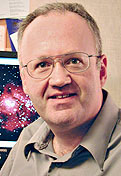 |
|
|
BOOK SALE - I'm selling off some scholarly books via Amazon Marketplace. Have a look!

|
2007
September
29-30
|
Closing out the month
I'm too busy — and tired — to write anything more this month.
Read Cathy's blog instead.
What are intelligent offspring for, if not to do our thinking and writing for us?
Permanent link to this entry


|

|
2007
September
28
|
Points of economics
A handful of interesting things have come up in Greg Mankiw's blog.
Here are my thoughts on two of them.
Social Security:
The problem is simply that people are living longer.
When Social Security was instituted, 65 was the average age of death
of well-to-do adults. Half the working population was not expected to live long enough
to collect retirement benefits. Now that almost all of us make it to 65, the only real solution
is to raise the retirement age. Do it in steps, and start doing it now, so that
a big sudden change doesn't have to be made in the future.
(A general word of life-planning advice: Modern advances have given you 15 more years of life.
Use them being productive. Don't use them being bored in premature retirement, and don't use
them to prolong adolescence to age 35, as a surprising number of young adults are now choosing to do.)
Universal health insurance:
For a moment, look at this just from the angle of enlightened self-interest.
The rest of us don't want to be impoverished by other people's bad decisions.
From that perspective, there are two inefficiencies to get rid of:
- People show up at emergency rooms and can't be turned away — but this is a terribly
expensive way to deliver medical care, and the rest of us end up paying for it.
They could have had the same medical care more cheaply
through other mechanisms. They could even have had preventive care, lowering their
total medical care costs. That's right — it can be cheaper to give medical care away
than not to.
- Medical catastrophes are a quick path into poverty. Poverty is bad for everybody, not just the
direct victims. Their children suffer, they themselves cease to be productive in the
economy, and indirect costs bounce around for years or decades afterward. Insurance prevents this.
I don't know how to solve the health insurance problem, and as Dr. Mankiw points out, right now
quite a few people are choosing not to have insurance even though they could have had it.
(What are you going to do with illegal immigrants?) But something needs to change.
Speaking of illegal immigration, someone in the discussion pointed out that if you want to be
lenient with illegal immigrants, you should also be in favor of free trade, because those
are two faces of the same coin. Either you let people (and jobs) move around or you don't.
Permanent link to this entry
How to drive straight into a crash
From this morning's Atlanta newspaper (Sept. 27):
Atlanta police spokesman Ronald Campbell said Herman Moore, 43, was driving northbound in the
southbound HOV lane on I-75 when the wreck occurred shortly after 7 a.m. near Howell Mill Road.
Campbell said a Cobb Community Transit bus driver "attempted to slow traffic down because
he saw the guy coming up the wrong way, but some of the drivers weren't able to see what he
was trying to do and went around him and they got into an accident with the [wrong-way driver]."
Got that? A bus in front of you slows down, and instead of thinking about why, you
immediately pass him and run right into whatever he was avoiding.
All those things they say about lemmings are really about Atlanta drivers.
I'm still doing battle with viruses — the biological kind, in my tonsils, not the
computer kind — but am gradually recuperating. I suppose it's a measure of my overall
good health that the worst illness I've had in 15 years was a sore throat. Or a measure of
how very bad this particular sore throat was!
Permanent link to this entry


|

|
2007
September
26-27
|
How to make your laptop last longer
(by protecting the power inlet connector)
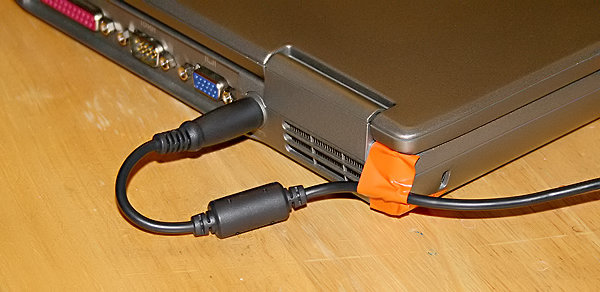
If you frequently move your laptop around with the power cord plugged in, do yourself
a favor and secure the cord to the body of the computer with tape or Velcro.
The reason is that the DC inlet connector (where the cord plugs into the
laptop) is the laptop computer's Achilles' heel.
It is likely to wear out prematurely and be expensive to replace.
A further word to the wise: If your laptop needs a new power inlet, find a repair shop
that can fix it without replacing the motherboard.
This repair costs $145 at University of Georgia TEC Services (to members of the University
community only), or $1000 at a shop that only replaces entire motherboards.
The power inlet on Melody's laptop gave up the ghost last night (Sept. 26) at 3 a.m.
in a rather spectacular way.
Melody was having a sleepless period and I got up to check on her.
I smelled something burning. The power inlet had somehow heated up and was about to
short out the incoming DC power, starting a fire. We're glad I caught that one!
Permanent link to this entry
Miscellany
I'm recovering from this dreadful sore throat but am fearful of a relapse, so except for
very short excursions, I'm still staying in the house.
Improvised electronic device: By now you've heard about the girl from MIT with an
electronic breadboard on her shirt, who was stopped at gunpoint in Boston Airport
because inspectors thought it was a bomb. Silly, right? It certainly concerns me if
our inspectors think anything with wires and batteries must be explosive.
It concerns me even more when
our journalists
call the device a "fake bomb."
If I wore T-shirts, I'd want one of these.
One of my worries is that
I might not be able to
travel freely with electronic devices, built in my lab,
that I need to take to conventions or other universities.
But wait a minute. The MIT girl
was also carrying a wad of Play-Doh, which does look like
an explosive (in that context).
And she described her intention as "art" — i.e., to make an impression on people.
She wanted to make an impression, and she did.
My take? There was plenty of bad judgment on both sides.
Cough, cough. I'm going to rest now.
But the rest of you, if you're in Athens,
please go hear
Ravi Zacharias tomorrow evening.
Permanent link to this entry


|

|
2007
September
25
|
Progress report
For the past 4 days I've been at home with a truly remarkable sore throat
(viral, not strep) and have done little... but I've seen some unusual things
on the Web. Here they are.
Most barbarous way to repair a laptop:
To fix a cold solder joint under a BGA IC, this fellow put a candle on top
of it. And then added alcohol and kerosene... He's lucky he didn't destroy
the IC while trying to heat up the connections under it.
Laser cutting machines are the next
generation's scroll saw. I understand they cost about $15,000, but
Ponoko
is a web site to which you can upload the plans, then purchase one or any quantity of the
laser-cut object you've designed. It does for laser fabrication what
CafePress did for graphic arts.
Test instrument of the day:
Smart Tweezers.
This is a resistance-capacitance-inductance meter that automatically measures all
three properties of a component and then tells you whether it's a resistor,
an inductor, or a capacitor (with what ESR). Just the thing for sorting out tiny
unlabeled surface-mount components. Tweezer-shaped so that it can handle them.
No, I haven't tried Smart Tweezers yet; this is not an endorsement.
Delcom gives us chips
that add a USB interface to anything you want to build, for just $8.
At last, USB for the masses.
And here's an interesting
essay on the mindset of people
who build perpetual motion machines.
See also A Budget of Trisections, by Underwood Dudley [Springer, 1987], for a similar
study of mathematical cranks.
A common theme of both groups is that they want you to review their entire calculations
(running through many pages) before saying they're mistaken. And that's not necessary.
Take an analogy from long division. If a schoolchild divides 2000 by 20 and gets 98
(not 100), you don't have to work through all the steps before declaring that the answer
is wrong.
Permanent link to this entry


|

|
2007
September
24
|
Facetiae
If you've never heard the comically clumsy lyrics of Dean Martin's 1953 song
"That's Amore," you
are fortunate.
But if you have, you probably know that a minor art form has grown up which consists of making
puns on the lyrics. Here is one that I occasionally inflict on Melody:
When a bunch of straight lines
Start to tangle and twine
That's a moiré.
For revenge, she recently found a large collection of such puns on the Internet and inflicted two of
the worst on me. (I don't know the original source.) For mathematicians:
When you make crazy lines
Just by adding up sines
That's a Fourier.
And for the rest of us:
When you never get bored
Touring fjord after fjord
You're in Norway.
I can't resist adding a linguistic note. In the original song, which is set in Naples,
Dean Martin correctly uses the Neapolitan word pasta fasul in place of standard Italian
pasta fagiole 'pasta with beans'.
Now you know.
Permanent link to this entry
TV nostalgia
 If the bird at the right looks familiar, you are probably
as old as me, or older.
It used to introduce NBC color TV shows, back when not all TV shows were in color.
Click here to see more
vintage TV network logos, and
here to learn about
the man who collects them.
If the bird at the right looks familiar, you are probably
as old as me, or older.
It used to introduce NBC color TV shows, back when not all TV shows were in color.
Click here to see more
vintage TV network logos, and
here to learn about
the man who collects them.
In retrospect, I'm amazed that color TV worked before about 1980. (It obviously started working
much better around then.) The reason is that color TV uses phase modulation, and until the
end of the 1970s, integrated-circuit phase-locked-loops were not available.
So color TV images were not very sharp, the color drifted, and the TV had to be adjusted often.
I'm down with a bad case of viral pharyngitis and there may not be the usual amount of material
here for a while. More news soon.
Permanent link to this entry


|

|
2007
September
23
|
Short items
[Updated]
Times I'm glad I went to Yale:
The Harvard Coop has
kicked out
(with police help) some customers who were writing down prices of books,
apparently on the ground that they would use the information to run a competing business.
Spirited discussion
ensued.
I was once ejected from a Wal-Mart for writing down prices of film that I was planning
to buy for my own use. It struck me as a weird thing for them to do.
I'm accustomed to a world in which retail prices are public knowledge.
That's certainly how the booming Internet economy works.
Film
is still alive, says Kodak.
Film is dead,
says astrophotographer Jerry Lodriguss, who shows,
with comparison shots of the same objects, that DSLRs are better.
Actually, I remember answering Kodak's survey. Yes, I still use film — but at 1/20 the previous
rate, or less. I rather hope it stays around, just as I hope phonograph needles remain available.
But it's not the mainstay of how I do things any more.
Another reason I'm glad I went to Yale:
Here
is a good rant by David Gelernter (one of Yale's top brains)
about how the Hayden Planetarium is losing its dignity, replacing the
old planetarium with some kind of newfangled laser-show monstrosity.
I believe Dr. Gelernter is Jewish and has therefore been spared the
"seeker-friendly church" movement, which turns
Christian worship into flashy shows
with rock music and Starbucks in the vestibule.
But that's what the new Hayden Planetarium
(as described in the article) reminds me of.
A planetarium or natural history museum
shows us the dignity of creation; a church, the dignity of God.
Or at least, that's what they should do.
If you turn either one into glitz, then suddenly
it's all about us and how to entertain us and the focus
is no longer on anything outside ourselves.
The day the newspapers will stop:
On October 7, for the first time in decades, no newspaper will be delivered to this house.
We're deliberately letting our subscription to the Atlanta Journal-Constitution run out,
having cancelled the Athens Banner-Herald a few years ago.
Nowadays we get our news through the Internet and, to a lesser extent, radio and TV.
We see no need for two or three pounds of wood pulp to be ground up, made into paper,
printed on, and delivered to us for momentary use, then discarded, every day.
That's a hundred pounds of paper a month.
Save a tree. Use the Web.
Permanent link to this entry


|

|
2007
September
22
|
Further to the notice posted here earlier,
e-mail service to covingtoninnovations.com has been restored.
The Fed did the right thing
A few days ago, the Federal Reserve System dropped the target interest rate
by 0.5%. Economists seem to agree that this was a good move.
Non-economists are criticizing it for widely differing reasons.
- Right-wing non-economists are criticizing the Fed for "bailing out"
the perpetrators of irresponsible lending. Their theory is that the Fed has
helped banks avoid the consequences of their folly.
- Left-wing non-economists are criticizing the Fed for not doing more
to keep people from losing their houses.
I'm a moderate non-economist, so let me inject a few opinions here.
The Fed didn't "bail out" anybody. The Fed's job is to regulate the money
supply to the benefit of the whole country. It needed adjusting, and they
adjusted it.
The problem is that the effects of irresponsible subprime lending are not
confined to the guilty. They spread all over the whole economy.
The Fed was acting to absorb the shock that was spreading across the
whole economy, not to "bail out"
a particular group.
As for people losing their houses, I have profound sympathy for those who
really were deceived by fraudulent promises, despite making an honest effort
to get a good deal. And the Fed hasn't done anything, directly, about this...yet.
Enforcement actions are coming.
But let's try to think clearly for a moment.
Is it a tragedy when people "lose their house" if they never could have
afforded it? Is it a tragedy that they have to go back to renting a house or apartment,
just the way they did before the overlending started? I don't think so.
They just failed to get a bargain they had been hoping for.
The economy does not owe everyone a house.
This is not like prying the homestead away from the pioneer who worked his whole life to build it.
And is it a tragedy if people knowingly sign up for house payments they can't afford
— or if they just don't ask what the payments
are going to be after the first year —
and then can't keep them up?
Again, I don't think so.
But in any case, the Fed didn't do anything specific about either of these cases.
The interest-rate reduction wasn't for moneylenders or overextended homebuyers.
It was for the rest of us.
Permanent link to this entry


|

|
2007
September
21
|
What does impact factor measure?
My research group has just had a paper accepted by a scholarly journal with an
impact factor of 2.7, which is fairly high.
Roughly speaking, impact factor is the number of times the
average article in a journal is likely to be cited by other articles within a year.
Extremely prominent journals such as Nature can have impact factors as
high as 30. On the other hand there are respected journals down in the 0.2 range.
Many scientists are evaluated on the impact factors of the journals in which they publish.
I think this is a good defense against "write-only journals" (those that nobody reads),
but I'm not sure it's a real measure of scientific success..
The reason?
Mainly, what an impact factor tells you is whether a lot of people are doing research on
the same thing at the same time. For a high impact factor, follow the crowd.
Schizophrenia Research has an impact factor of 4.5 because schizophrenia researchers
are a close-knit community.
But do we want everybody to do research on the same thing at the same time?
I don't think scholarship should be fad-and-fashion-driven.
A journal that publishes highly original research might have a lower impact factor
because there isn't a ready-made community of people to take the ball and run with it.
The impact factor also might be low if the research is needed in the long term more than
in the short term, such as studies that lay mathematical groundwork or
preserve historical information.
Permanent link to this entry
Miscellany
I'm told that
WinDirStat
is better than the Zero Assumption Disk Space Visualizer.
Check it out.
Next month I'll be attending at least part of the
Peach State Star Gaze,
which will be my first visit to the
Deerlick Astronomy Village.
All of this is less than 80 minutes' drive from where I live, so I'm looking
forward to going there regularly.
Permanent link to this entry


|

|
2007
September
20
|
Veil Nebula in hydrogen-alpha

Here's the Veil Nebula photographed from my home, where the limiting
magnitude was about 3.5. This was done with a B+W 091 filter and Canon XTi, picking up
only a narrow part of the spectrum near 656 nm, which fortunately includes much of the
light emitted by the nebula. This is an enlarged part of a larger picture taken with a 105-mm
lens at f/2.8. Stack of three 6-minute exposures, minus dark frames.
Permanent link to this entry
Miscellany
If I weren't so tired from work, I'd be building
this right now.
It's an FM crystal radio.
Now that the urban environment is full of strong FM signals, it's practical!
Demodulation is by slope detection and gives very good sound quality, or so I'm told.
There are special drill bits
for drilling Plexiglass and other hard plastics. Something I've needed off-and-on for 30 years...
Technology of the day: Erasable
but permanent tattoo ink,
permanent until hit with a laser beam.
(Read until the end of the article.)
For people who want to be rebels at age 20 but employable at age 22.
Seriously, for a moment — How soon will economists recognize
self-disfigurement as a path into poverty? Prominent tattoos, especially if
they have obnoxious content, are a quick way to make yourself undesirable on the job market.
And don't tell me people are unfairly "discriminating" against you when they
judge you for something you
did voluntarily. It's like what I wanted to say to hippies back
they were my contemporaries: "The reason people judge you by your long hair is that
you grew your hair long to send them a message, and they're listening to it."
Permanent link to this entry


|

|
2007
September
19
|
Autofocus telephoto moon

This was too easy.
I put the 300-mm lens and 1.4x converter on the Canon XTi, put it on a tripod,
guessed the exposure (1/200 second, f/8, ISO 200), set the mirror lock and self-timer,
centered the moon in the field, and pressed the button.
Slight unsharp masking (sharpening) was done later in Photoshop.
Permanent link to this entry


|

|
2007
September
18
|
Borrowing a baboon's liver
I've come across some strange things while reading old scientific journals at random
(and then following up the references),
and I fully expected this one to turn out to be a hoax, but it apparently wasn't.
In 1968, a woman almost dead of liver failure was successfully treated by
having her blood circulated through a live baboon.
You heard me right.
Where was this strange procedure done? South Africa, of course.
C. N. Barnard, the inventor of the heart transplant, was involved.
They anesthetized the baboon, replaced all its blood by saline solution and then by
human blood, and connected its circulatory system to the human patient.
For a few hours the baboon's liver then did what the human's liver couldn't —
cleaned all the toxins out of the blood.
Then they disconnected them; it is not reported whether the baboon survived,
but the human made a dramatic recovery three days later.
A critic, G. M. Abouna, writing in The Lancet exactly 2 weeks later, points
out that the procedure probably didn't cause the recovery.
If it had helped, the help would have been immediate; at least some of the recovery
would have started immediately, without a two-and-a-half-day delay.
But in 1972 Dr. Abouna reported successful use of an even weirder technique
— connecting the human's circulatory system to
a baboon liver kept alive in a jar. In Augusta, Georgia.
References:
Saunders SJ, Terblanche J, Bosman SC, Harrison GG, Walls R, Hickman R, Biebuyck J, Dent D, Pearce S, Barnard CN.
Acute hepatic coma treated by cross-circulation with a baboon and by repeated exchange transfusions.
Lancet. 1968 Sep 14;2(7568):585-8.
Bosman SC, Terblanche J, Saunders SJ, Harrison GG, Barnard CN.
Related Articles, Links
Cross-circulation between man and baboon.
Lancet. 1968 Sep 14;2(7568):583-5.
Abouna GM.
Cross-circulation between man and baboon in hepatic coma.
Lancet. 1968 Sep 28;2(7570):729-30.
Abouna GM, Fisher LM, Still WJ, Hume DM.
Acute hepatic coma successfully treated by extracorporeal baboon liver perfusions.
Br Med J. 1972 Jan 1;1(5791):23-5.
For PubMed links
click here
and search by author and title keywords.
Permanent link to this entry


|

|
2007
September
17
|
Pictures!
On the evening of September 15, Ken Warren invited me to do some astronomy with him
at his home in semi-rural Jackson County. These pictures are the result.
The super-clear weather of the early morning did not hold up, and conditions
deteriorated during the evening — but nonetheless this was the best astronomy
weather we've had in months.
All these pictures were taken with an unmodified Canon XTi and 300-mm f/4 lens at f/5.0,
piggybacked on my equatorially mounted telescope and autoguided with an SBIG STV.
Each, unless otherwise noted, is a stack of about five 3-minute exposures, minus a set
of 6 dark frames to eliminate hot pixels.
First, the star cloud M24, photographed in late twilight and moonlight — I didn't
want to wait for complete darkness, and I don't regret starting early. This is a cloud of stars
near the center of our galaxy; you can see some dark nebulae (gas clouds) in front of it.
This 600-pixel-wide image doesn't do justice to the 10-megapixel original, which deserves to
be printed poster-sized.

Next, the star cluster M11, seen against a rich field of stars.
What you see here is a cropped image; the original, again, deserves to be printed
poster-sized and gives the impression you are approaching M11 in a spaceship.

Next, even though the air above me was becoming less transparent, I decided to go
for a more difficult object, the Crescent Nebula (NGC 6888) in central Cygnus.
This is a stack of just two 3-minute exposures, and you're looking at a small area
of the original picture. I had never photographed NGC 6888 before (except incidentally
as it fell within a larger-field image); consider this a prototype for better
pictures to come.

I also photographed the Veil Nebula, and in my opinion this picture
(cropped, but viewable much larger than the way you see it here)
captures what it's like to view the Veil through a telescope at a very
dark-sky site.

Last, between Cygnus and Aquila is an asterism or small cluster known
as the Coathanger because that's what it looks like (upside down).
Note the star cluster NGC 6802 at the left.

Permanent link to this entry
Humor division, type: fishy
Have you seen the
blobfish yet?
This fat, shapeless creature lives deep in the ocean, under high-pressure conditions,
and looks remarkably like a melted version of
Ziggy.
Permanent link to this entry


|

|
2007
September
16
|
The Zero Assumption Disk Space Visualizer
Melody was looking for a utility to help her look for excessively large files that might be
lying around wasting space on her computer. Looking around on the Web,
I found the
Zero Assumption Disk Space Visualizer,
which is freeware.
It's given away by a company that sells data recovery tools.
I know nothing about the rest of their products, but this one impresses me.
The contents of any folder are shown as boxes whose size is proportional to the
amount of space they take up. Small items are lumped into a box called "Others."
You can find out more about any item by clicking on it.
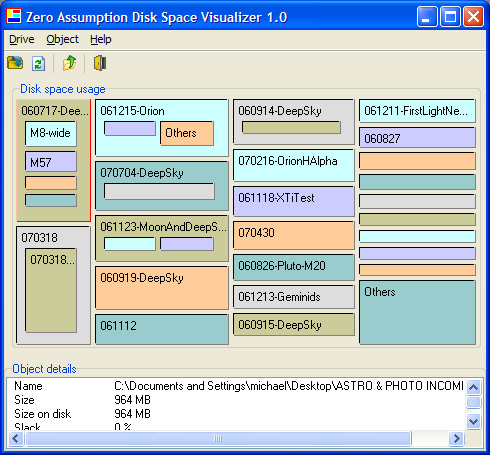
I know nothing about this company's other products, but this one is handy,
and the price is right.
Permanent link to this entry
The stars are back!
We haven't had really clear weather since April or May.
But around 3 a.m. on the 15th, I woke up, looked outside, and was delighted to see
5th-magnitude stars and M31 (the Andromeda Galaxy) with the unaided eye.
Tropical Storm Humberto gave us a lot of rain the previous day, and the clear skies of
autumn are finally here. Expect some astronomical pictures soon.
Permanent link to this entry


|

|
2007
September
15
|
Miscellany
Age: Turns out most people thought I had been that old for several years already.
(50 or 248? They aren't saying.)
Culturally illiterate ad agency:
Does anybody else think Hunt's new "Manwich, Manwich, we adore thee"
TV commercial is demeaning to Christians?
I suspect the people in charge of it
honestly didn't know what piece of music
was being made fun of.
If you've seen the commercial and didn't like it,
click here and tell 'em.
Note: I'm not just talking about the tune, which is from Beethoven.
The whole Manwich jingle is a line-by-line parody of a
well-known hymn.
I wonder if this is from the same ad agency that
gave Nextel the Hallelujah Chorus.
Want to make a Windows XP kiosk?
If you want to turn a Windows XP machine into a kiosk that only runs one particular program,
and never shows the Windows desktop, you can apparently do it either of two ways.
You can use
Windows XP Embedded,
or you can take a straight copy of Windows XP and
change some registry settings,
HKEY_LOCAL_MACHINE\SOFTWARE\Microsoft\Windows NT\CurrentVersion\Winlogon
for the whole computer
or
HKEY_CURRENT_USER\Software\Microsoft\Windows NT\CurrentVersion\Winlogon
for just the current account (and then log out and log in again).
I recommend the second approach; use a password-free account for the kiosk, and
leave an administrator account in place, password-protected, for when you want to change the setup.
Regarding this, Brook Monroe writes:
As someone who's been in the kiosk business for well over 10 years, I
thought I'd bring to light something important: if you use a Windows XP
Embedded license to create a kiosk, you can never change what's on that
kiosk afterward. The company where I work tried doing that years ago,
and found we were in violation of the licensing terms, as airline
check-in kiosks inevitably need upgrades as more features are added.
While it's always possible in an ASP.NET web application to create new
screens and new functionality based purely in software (which are stored
on a server and not the kiosk), one finds that one can't add new device
drivers — or indeed, new device support — without running afoul of the
license.
As for changing the registry settings to produce kiosk-like behavior,
it's far easier and flexible not to replace the Windows shell per that
link in the blog posting. Instead, use registry settings to hide the
task bar, and write a full-screen presentation layer that runs as a
service. My company uses a self-developed application shell which may be
found on airline check-in kiosks at your friendly neighborhood major
international airport, as well as smaller regional airports all over the
United States.
Leaving the regular Windows shell in place makes for easier QA testing,
easier debugging, and easier maintenance.
Research: A major new line of research was set in motion today (Sept. 14);
I hope to be able to tell you about it soon.
Permanent link to this entry


|

|
2007
September
14
|
Half-century?
There are rumors that today (Sept. 14) is my 50th birthday,
but the story I'm putting out is that
the digits on my birth certificate are in the wrong order,
I was actually born in 1759,
and I'll celebrate my 250th in a couple of years.
Permanent link to this entry
What's wrong with this picture?

Sept. 13th's economic news struck my inexpert eyes as truly odd.
Banks are offering mortgages at 5.6% and savings accounts at 5.3%.
The federal funds rate has dropped 0.25% without
the Fed doing anything to lower it.
And everybody is announcing a recession, so of course the stock market
is off like gangbusters, up 1% in one day. I don't understand it.
I'm no economist, but I'm sure the policymakers are trying to figure out
whether the mortgage crisis is inflationary or deflationary.
House prices are going down, but house payments are going up.
Permanent link to this entry


|

|
2007
September
13
(Extra)
|
Making Windows look at updated registry and path settings
This evening I had an odd thing happen.
I was installing MiKTeX — but it could have been anything —
and immediately after doing so, I ran a .bat file that used some
MiKTeX commands. They weren't found!
It turns out that when you make changes to the command search path, or
any other item in the Registry, Windows may not see the changes right
away unless you broadcast a WM_SETTINGCHANGE message to all processes.
Details
here.
How do you do that?
I wrote and compiled
a short C program which you can download here.
To notify all your Windows processes that there have been changes,
just run UpdateEnv.exe.
Note: Even this will not change the path of a command
window that is already open.
Since my problem has only happened once and I've installed MiKTeX many times,
I think the installer probably broadcast the message, but it got lost
somehow on this one occasion.
Permanent link to this entry


|

|
2007
September
13
|
GULP (Graph Unification Logic Programming)
Instead of writing a Daily Notebook entry,
I've just released version 4.0 of GULP, a software tool that I've been using,
in one form or another, for 20 years.
Documentation
here;
other downloads
here.
Permanent link to this entry


|

|
2007
September
12
|
Should there always be a Belgium?
A modest proposal from
The Economist:
the nation of Belgium,
which is having trouble electing a Parliament,
should disband.
After all, Belgium was created by political expediency in 1831
and has always consisted of two districts with different languages
and cultures.
Split them apart and either turn them loose or let the French portion
join the French and the Dutch portion join the Dutch.
Or so the editorial writer suggests.
Permanent link to this entry


|

|
2007
September
11
|
Miscellany
The
Canon EOS 40D
has gotten a
rave review from
French astrophotographer Christian Buil.
He says DSLR technology has finally arrived.
"Le EOS 40D, le boîtier [DSLR] de la maturité!"
Here's the truth about lens fungus.
Most of us have seen fungus-infested camera lenses.
The fungus doesn't eat glass, nor lens coatings; it eats oil that has gotten on the lens,
even if it's only a thin layer. This is probably a good reason to lubricate lenses with silicone,
which is inedible.
Medical headline:
Mild
schizophrenia exists and is treatable.
This has been a major area of research for some time.
Since schizophrenia is defined as a disabling condition, we don't know how many people are walking around
with the same kind of impairment, in milder form, and others just think they're lazy or confused.
News for subprime lenders:
Foreclosure
doesn't work.
The amount of value recovered is usually much less than the appraised
value of the house.
Of course, during the boom, this fact wasn't figured into their calculations.
But now it's a powerful incentive for lenders to renegotiate loans rather than foreclose.
Of course, the real reason for the subprime crisis was probably fragmentation of the
decision-making process. The mortgage broker, initial lender, and ultimate investor were
all separate, and each trusted the others too much.
Note also the Laibson plan
for restoring sanity to the mortgage market: Require that all mortgages be prepayable without penalty.
That way there will be no "teaser" rates.
I foresee a student loan crisis in about five years. People are going to college and
getting hopelessly in debt — even though a good, cheap education is more readily available
than it has ever been before. Of course, for prestige, you have to go to a college that was
good 75 years go, rather than one that is good today.
Permanent link to this entry


|

|
2007
September
10
|
Print this out and give it to a young person

Print this out and give it to a young person (male or female), and ask them to spread it around.
Click on it for the rest of the story.
Jennifer Ann would have been 20 on September 9.
Permanent link to this entry


|

|
2007
September
9
|
M8 through murk
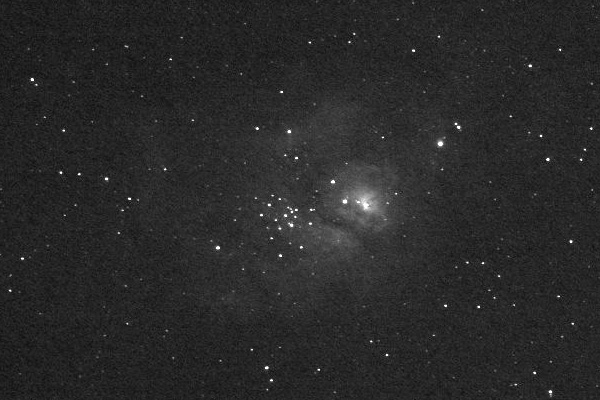
This picture was an experiment to see if I could photograph M8 (the Lagoon Nebula)
with an unmodified Canon XTi and a filter
(B+W 091)
that cuts off almost all visible light,
transmitting only the deep red portion of the spectrum
(and thus cutting off almost all of Athens' streetlights).
It worked, although I didn't give enough exposure. Here you see a stack of
four 3-minute exposures at ISO 800 (minus 3 dark frames),
with a 300-mm lens at f/5.6.
I should have used 6-minute exposures and taken a lot more of them.
The picture is grainy, but with some help from Neat Image, I got good
enough results to validate the technique.
At the time, the sky was hazy and
I could not see stars fainter than 3rd magnitude with the unaided eye.
Permanent link to this entry
C# compiles fast
In one of his books Eric Gunnerson points out a design goal of C# that people
don't talk about much: fast compilation.
There we can see the hand of Anders Hejlsberg, inventor of Turbo Pascal
(the incredibly fast Pascal compiler that took the world by storm in 1984,
when we were using 4.7-MHz PCs).
That's why C# doesn't have the full #define capability of C.
No macros. It's a programming language all on one level, compilable
(probably) in one pass, or just a little more.
Permanent link to this entry
Futuristic computers of 40 years ago
Who remembers the
Burroughs B5000?
That was a computer ahead of its time.
Designed for structured programming (a decade before structured programming
was invented!), it ran an extended form of ALGOL (similar to Pascal) as its
native language. There was no assembler, only an ALGOL compiler, or, later on,
several varieties of them. The CPU was stack-oriented, designed for ALGOL's
(potentially) recursive procedure-calling mechanism.
The operating system had a hierarchical (folders-within-folders) file system
like Windows and UNIX, both of which were far in the future.
The designers had the foresight to realize that character-string processing is very
important, even if the customers say they only need a computer for
numerical work — because compilers are string processors, and everybody has to
compile programs!
The architecture persisted into microcomputer days, but apparently, in recent
decades Burroughs (now Unisys) catered only to government contractors, and the
product line became obscure.
But I can remember hearing about B5000 systems in the mid-1970s, when, as an
undergraduate, I was trying to learn all I could about programming languages.
I thought they'd be the ideal computer to work with. Ah, to be young again...
And I wish there had been a bit more Burroughs and a bit less UNIX and C at the
end of the 1970s, when serious microcomputers were taking shape.
ALGOL is an inherently safer language to work with than C because
it doesn't rely so much on explicit pointers.
I have no idea what the operating system user interface (MCP) looked like.
Does anyone? That is one thing UNIX did right — they got as much mileage
out of a teletype-style interface as anyone possibly could.
Update: Bruce Baker points out that there are plenty of
classic Burroughs manuals at www.bitsavers.org.
Permanent link to this entry


|

|
2007
September
8
|
Mental illness and Christian faith
The other night I stumbled upon a
patient's
Christian testimony hidden in the middle
of a major medical journal.
It turns out the author has a
web site
with more good material on the same topic.
I have a few observations.
First, the more we come to understand mental illness as brain impairment, the less we want
to divide people sharply into "crazy" and "sane." Rather, there are levels of functioning (just like levels
of physical stamina, etc.) and it's not an all-or-nothing thing. A few people have impairments that
cause them serious trouble. Those we classify as mentally ill.
Second, any dull-minded materialist can say that this person's religious experience was a delusion.
However, if the coming of this delusion produced an overall improvement in the
patient's health and functioning, then you look a bit silly calling it a psychotic symptom.
(Note that in this patient's experience,
genuine Christian faith produced an improvement but a pseudo-Christian cult, earlier in her life,
produced a decline. Make of that what you will.)
Third, for Christians, perfect health (mental or physical) is not the summum bonum because
this life is not all there is.
You don't have to be perfectly healthy for life to be worth living.
Permanent link to this entry
Who says Windows is unreliable?
If you believe those Macintosh ads, Windows crashes all the time.
But I submit for your perusal this morning's status report from
my four Windows servers, three of which run application software via
Remote Desktop:
Status of AI servers:
\\AI0 has been up for: 15 day(s), 18 hour(s), 43 minute(s), 4 second(s)
\\darwin has been up for: 69 day(s), 18 hour(s), 50 minute(s), 45 second(s)
\\mendel has been up for: 69 day(s), 18 hour(s), 48 minute(s), 24 second(s)
\\leibnitz has been up for: 69 day(s), 18 hour(s), 45 minute(s), 1 second(s)
They reboot when necessary for Windows Updates. Otherwise they just run.
Permanent link to this entry


|

|
2007
September
7
|
Miscellany
Want to make a PDF file from a paper document using a scanner and Adobe Acrobat?
Here are my tips on how to do it.
Adobe's defaults don't give the best results, in my experience.
Meerkats
in the zoo in Longleat, England, managed to take pictures of each other by poking at a camera that
had been left in their enclosure, and of course it's a Canon EOS SLR. Only the best...
The electronic skill I need to master next is
designing printed circuit boards by computer
(the modern way — I've already done it several earlier ways)
so they can be
cheaply
fabricated in China.
(Shhh! Don't tell my consulting clients I'm not into this yet...
So far, all my prototypes have been built in my own workshop.)
The video astronomy technique that I've been using for lunar and planetary images
(many of which you've seen in this blog)
is now
being put to very good
use by professionals at Cambridge, who are using earth-based telescopes to outperform
the Hubble. They call it "Lucky Imaging" (you select the sharpest frames in a video sequence,
and if you're lucky, they're very good). They're using a new super-high-performance CCD camera
rather than my $150 webcam.
Some economists think
we should all carry several hundred dollars in our pockets because the time saved, from
not having to go to ATMs so often, would outweigh the risk of losing it.
That's the way my Grandpa Roberts felt, back in the 1960s, when you could only cash checks during
business hours.
But I think there may be a hidden factor. If it became customary for people to carry $1000 rather
than $20 in their wallets, and robbers knew it, wouldn't the risk of being robbed go up?
Of course, maybe for $1000 they'd take the cash and let you keep your credit cards.
Hang up and live: I want to come back to this topic, but
here
the great Judith Martin gives advice about how to deal with
people who are so wrapped up in electronic communication (or entertainment)
that they will never give their full attention to the people who are right in front of their face!
Her solution: Exclude them from social life. If they need to work, they don't need to be at your party.
Credit
cards for the bankrupt (or nearly bankrupt): Yes, the subprime crisis has made it easy for
credit card companies to tell who the suckers are. Or so we are told by the Boston Globe.
Here's
someone who blames the Fed for the subprime-lending crisis (for keeping interest rates too low).
I disagree. It's the lenders and, to some extent, the borrowers. Everybody knew those low interest
rates weren't permanent.
Employees' rights: Much as I detest smoking, I don't agree with the modern practice of
forbidding
employees to smoke when they're away from work.
The reason? A broader set of rights is at stake.
Employment is not slavery.
An employee should have the right to do anything he wants, outside the workplace,
if it's legal and doesn't affect the employee's performance or the employer's business.
This includes political campaigning, religious activity, and so forth.
Courts and legislators tend to agree with me on this.
(But smokers can be required to pay their extra insurance costs.)
And of course employers don't have to allow illegal activities, such as drug use.
Another category of dangerous insect:
caterpillars that sting,
especially the
Puss Caterpillar,
which looks like a walking wad of lint.
Over the weekend I heard about someone who was very ill after being stung by one.
The Georgia woods are full of venomous creatures!
Permanent link to this entry


|

|
2007
September
6
|
A word in favor of life
How would you feel if your parents had killed your brother or sister?
That is the plight of people, now young adults, whose parents confide that
they used abortion to limit the size of the family.
At least, that's what I glean from a recent conversation with a student
who has talked with others.
The children of pro-abortion parents aren't happy about it.
They feel like people who have escaped from a battlefield —
except that the enemy was their own parents.
"At least you didn't kill me, Mom and Dad..." What a thing to have to say.
Has child abuse vanished since 1973? Do we really live in a world where
"every child is a wanted child"? Far from it.
Abortion-on-demand has legitimized the notion of an "unwanted child,"
legitimized the act of rejecting your own baby.
Two generations ago, refusing to love your own child, even before birth,
was considered reprehensible, no matter how unexpected the child might
have been. Things changed in the Selfish Seventies.
Tuesday night's episode of the TV show House (Sept. 4) made a striking
pro-life point. I didn't see all of it, but the climax of the plot was when
they did successful,
highly experimental open-womb surgery on a 1-pound fetus, thereby saving both
the child and
the mother. Dr. House had advocated an abortion, not just for convenience, but to save
the mother's life, but a colleague persuaded him to keep trying.
There is a touching scene during the operation
where the surgeon's finger is grabbed by
the fetus's tiny hand.
At the end, the mother thanks him, and he replies, "Don't thank me —
I would have killed the kid."
Permanent link to this entry
Will Windows mistake your robot (or something) for a serial mouse?
Here is an extended discussion
of a weird situation: Technician builds an experimental circuit that sends data into the
serial port of a PC. The PC runs a program and logs the data for hours.
Somehow the PC then becomes convinced that the serial data stream is coming from
a serial mouse, and suddenly starts treating it as mouse movements.
Can this happen?
Microsoft says yes,
and to prevent it you have to either disable the serial mouse or make a registry setting.
(The "hotfix" they offer on the page I just referenced is just to enable you
to make the registry setting.)
See also
this.
Query: Can the problem arise at any time other than boot-up?
I don't think so, though the original story doesn't make this clear.
The moral? Unless you've taken special measures,
don't reboot a Windows PC that has anything on its serial port
that is continuously outputting data.
The most common culprit is reportedly a GPS receiver or a UPS that has
a serial data connection.
And I think this is a classic case of bad design.
The serial mouse should have been designed so that nothing else would be mistaken for it —
the protocol should have required it to produce a very unusual data stream on demand.
Also, Windows should not look for a serial mouse if any other kind of mouse (USB or PS/2)
can be found; after all, you only have one mouse.
But Windows may not be what's badly designed.
It's following a 1995 Plug and Play standard which you can read
here
and which is also used by Linux and other operating systems.
Looking carefully at the protocol, I see that the real problem is that
they tried to "grandfather in" too many old serial mice that were not
designed to conform to any standard and do not send a distinctive code.
So nearly anything that sends data to the serial port might be a mouse,
as far as the OS can tell.
I think the correct solution is to get rid of serial mice by default
and tell Windows never to try to auto-identify ("enumerate") serial-port devices.
I understand this can be done with the /noserialmouse setting in XP's boot.ini
file; don't know about Vista.
Permanent link to this entry


|

|
2007
September
5
|
News from the world of brain science
A couple of interesting studies I came across while looking for something else today:
There may soon be a medical test for depression based on measuring the
sensitivity of the sense of taste. It has been shown that the sensitivity
of human taste buds
depends
on the levels of the neurotransmitters serotonin
and norepinephrine, which are the ones that are low in depressed people.
And statins (anti-cholestrol drugs) prevent strokes more than one way.
Not only do they keep your arteries from clogging up, they also
greatly
improve the survival and recovery of brain tissue
that is deprived of circulation.
Permanent link to this entry
Cathy's rejoinder
"To travel hopefully is a better thing than to arrive." — Robert Louis Stevenson, 1881
"Those are the words of someone who has never driven in Atlanta." — Cathy Covington, 2007
Permanent link to this entry
Things to come
Topics I hope to come back to, time permitting...
I've found out
where
to get a really good calligraphy pen.
Melody's father gave me an iridium-point gold nib for italic calligraphy, 1.5 mm wide.
It's much better than the usual calligraphy pen nibs, which are simply cut off straight;
it's reinforced by thickening in the right places and has slightly rounded edges, just the way
they made them back in Ye Good Olde Days.
Today the Federal Reserve System issued
guidance for
mortgage lenders
(many of whom are not the people who originated the loans — not only
consumers but also lenders have been left holding the bag).
Key quote:
Loss mitigation techniques that preserve homeownership are generally less costly than
foreclosure, particularly when applied before default. Prudent loss mitigation strategies may
include loan modifications; deferral of payments; extension of loan maturities; conversion of
adjustable-rate mortgages into fixed-rate or fully indexed, fully amortizing adjustable-rate
mortgages; capitalization of delinquent amounts; or any combination of these.
Recall that Bush has asked Congress to eliminate the income tax on "virtual income" from
a partially forgiven debt (i.e., if your lender changes your debt from $200,000
to $150,000, he says you shouldn't be taxed on the $50,000 that they "gave" you).
I think this is a good idea.
You'll remember
my remarks
on the subprime lending crisis, quite a while ago.
The mysterious smell near my office is attributable to hundreds of cigarette butts,
some discarded food, and at least 2 dead birds. The building superintendent, who is new
on the job, helped me investigate a bit today. More news soon.
Permanent link to this entry


|

|
2007
September
4
|
Dragon*Crowd
Cathy and Sharon are back from this year's
Dragon*Con
science fiction and fantasy convention, and they found it
incredibly overcrowded.
Fire marshals were turning people away from hotels and
conference rooms because the crowds were so thick.
Although they had a good time meeting up with friends,
Cathy and Sharon found it almost impossible to attend scheduled events.
Clearly, the management just sold too many tickets.
Surely the purpose of tickets is to regulate the size of the crowd —
not just bring in money for the organizers!
My girls brought me a present, a quaint early 1980s computer book
that has nothing to do with Star Wars except that R2D2 and C3PO appear
in the pictures:

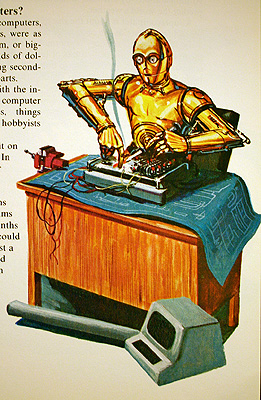
Here, for instance, you see C3PO assembling a Heath-Zenith H19 terminal.
To my surprise and the girls' delight, the author turns out to be Fred D'Ignazio,
with whom I worked when writing for Compute Magazine in the mid-1980s.
See? I was really there, genuinely part of the Computer Revolution, just as your
grandfather was part of World War II. Admittedly, he didn't know Eisenhower personally,
nor did I know Bill Gates...
Cathy and Sharon also report that realistic portrayal of the 1940s and 1950s
now has a place at Dragon*Con; so does Erik Estrada from the 1970s TV show CHiPS.
Exactly where are the boundaries of science fiction and fantasy now?
Permanent link to this entry
Working on Labor Day
On Sunday, a waitress, making small talk with Melody and me in a Gwinnett County restaurant,
was incredulous that I am voluntarily working on Labor Day on a computer consulting project.
Well... It pays well, it's interesting work, and I need the money. So I'm going to be working today.
What's wrong with that? Some of us enjoy working (either for the work itself or for the rewards),
while for others, work is to be minimized and the goal of life is to get days off and
consume entertainment.
As I've noted earlier, that's a major reason
why different people have different incomes.
Some just want to work more than others.
The last thing I want is some naive socialist coming along and telling me
that by working hard, I'm taking away somebody else's opportunities.
(It seems to me that by being productive, I'm creating opportunities
for other people.)
But that attitude was moderately common in pre-Thatcher Britain.
Permanent link to this entry
Acrid smell tracked down — I think
I think I've finally found the source of a
mysterious smell,
partly tobacco smoke and partly something more acrid,
which has been haunting my office for years and has
recently gotten worse.
Smokers are tossing smoldering cigarette butts through some kind of drainage grating
that leads under the building and apparently connects with the building's air
intake. Whether it should connect is of course something to be investigated,
but in the meantime, I'm more concerned about the fire hazard, as well as the smell.
If these people don't want the University to ban smoking entirely, they need to shape up.
Ashtrays are provided and designated smoking areas are marked.
(In fact the designated area is bigger than the area where they normally stand,
and it has a roof over it — useful in the rain, or so one would think.)
Yet there are thousands of cigarette butts on the ground in what is meant to be a
flower bed. And this target practice on gratings that lead into the building
is not acceptable.
Ouch! After I thought the problems were fixed, Google still isn't indexing
the March 2007 page of this Notebook. Dear Google, when you scan this page,
please also follow this link. Thank you.
Permanent link to this entry


|

|
2007
September
3
|
Another blog to read
I'm too busy to write anything today, so go read
Eric Gunnerson's blog instead,
especially if you're interested in .NET programming.
He, in turn, refers to
Worse Than Failure, an
insightful (and often funny!) blog about badly designed software.
Permanent link to this entry


|

|
2007
September
2
|
What's bad about bad grammar?
For a sampling of things linguists know, but others
(even English teachers) often misunderstand,
read
this.
I wrote it today to help settle some arguments in an online forum.
Permanent link to this entry


|

|
2007
September
1
|
|
Golden anniversary!
Today (Sept. 1) is the 50th wedding anniversary
of Melody's parents, Jim and Eleanor Mauldin.
I want to wish them my most heartfelt congratulations,
not only because without them,
Melody would not have existed (!), but also because
their 50-year marriage is an achievement and an inspiration to all of us. Well done!
Permanent link to this entry
|
Grimaldi and Mare Orientale
|
Doug and Lori Downing have been here for a visit.
Things we did together included
a trip to a jousting match
but also,
in keeping
with our tradition, a bit of astronomy.
Because of bad weather and busy schedules, we only observed for 30 minutes
and only saw one thing — the limb of the waning gibbous moon, with the
dark crater Grimaldi and the
outermost ramparts of Mare Orientale
visible right at the edge. (We were clouded out of the
lunar eclipse on Tuesday morning.)
Here's an image made from 2250 video frames taken with a ToUCam Pro and my
trusty 5-inch Celestron, through an infrared-pass filter (which explains
the somewhat unusual shading). The red color is artificial but helps
to remind you that it is an infrared image.
|
|

|
Permanent link to this entry
Miscellany
Here is a map of
MARTA (the Atlanta subway).
And with that in mind,
here is the same map with
all names changed into different words composed of the same letters
(e.g., "Peachtree Center" becomes "Retrace the pence"). Enjoy, if you can.
CNC for everybody: A computer-controlled woodworking machine
is now being sold by Sears Roebuck
at a price that many serious woodworkers can afford. I wish I had one — and the time to use it!
Lacking the latter, I'll do without the former.
I seem to recall that,
besides woodworking, it can make printed-circuit boards by milling away the copper
in the right places.
The Audichron lady, whose voice you heard
giving the recorded time of day on the telephone, was a University of Georgia graduate.
Longplayer is the world's longest piece of music.
Listen to some of it. Nobody has heard it all yet.
Something they'll never get me to drink:
Beer with coffee in it,
manufactured locally. (And 7.5% alcohol, twice the strength of ordinary American beer.)
As usual, the mind boggles.
Permanent link to this entry


|

|
| |
Entries are most often uploaded around 0000 UT on the date given,
which is the previous evening in the United States.
| |
